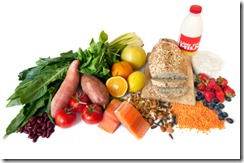February is American Heart Month, so what better time to concentrate on your cardiovascular health?
You have no doubt heard all the advice about getting exercise and kicking the smoking habit, but do you know how critical your diet is to heart health? When you make unhealthy choices, your heart pays the price. Consider these ideas.
Cut the sodium. The U.S. government recently released new dietary guidelines, and one key recommendation was that Americans need to lower their sodium intake. Sodium can raise blood pressure and is found in fast food and processed food, but it’s also prevalent in foods you might not expect: ham, hot dogs, and bacon; ketchup and some mustards; certain soups, sauces, and salad dressings; white bread, some cereals, and seasoned rice. It is critical that you read the labels of the foods you eat. Limit yourself to less than 2,300 mg of sodium at day, which is equivalent to a teaspoon of salt. Less than 1,500 mg is even better.
Learn about fats. Eating a low-fat diet is usually a good heart-healthy choice, but be sure you know the difference among fats.
· Trans fats are found in many cookies, crackers, donuts, French fries, and other snack items. You can also find them in flavored coffee creamers. Often in the form of partially hydrogenated oils, these fats lower your good cholesterol and raise your bad cholesterol. Also, a label can say “Trans fats 0 mg” even when small amounts are present. If you consume lots of these small amounts, they can add up, so read the ingredients list. You should aim for less than 2 mg of trans fats a day—or none at all.
· Saturated fats can raise your cholesterol levels and lead to heart disease. You’ll find these fats in beef, pork, some poultry, lard, cream, butter, and other dairy (whole or reduced-fat varieties). Experts suggest no more than 16 grams of saturated fat a day.
· Monounsaturated and polyunsaturated fats are actually beneficial to you heart when used in moderation. You can find monounsaturated fats in olive oil, canola oil, and other vegetable oils, as well as in nuts and seeds. Polyunsaturated fats are present in safflower oil and soybean oil, as well as in fish such as salmon, herring, trout, and mackerel.
Eat plants. It may sound simple, but the more plants you eat, the happier your heart will be. Fresh fruits and vegetables, whole grains, nuts, seeds, and legumes provide a variety of nutrients that your body needs. These are high in fiber, and they can lower both your blood pressure and your cholesterol levels. Try to make plants the focus of your diet, rather than an afterthought.
Get protein wisely. Your body needs protein, but be careful where you get it. Fatty red meat and processed breaded chicken are not good options. Instead, choose sources such as lean poultry, fish, soy, and low-fat (or nonfat) dairy.
Watch your calories. If you eat a diet rich in plant sources, you will probably not have calorie issues. However, calories from candy, creamy dressings, and soft drinks can accumulate quickly. Make an effort to cut sugary foods from your diet and save them just for special occasions.
Before you plan your next meal, think about your heart. What is the best way to feed it?
To learn more about cardiovascular health, contact the Heart Center at North Hills Hospital. Visit us online or call (817) 255-1000 for a physician referral. Serving North Richland Hills and Northeast Tarrant County, we’re here to answer all your questions.
Sources:
USDA
American Heart Association
Related Posts:
Can You Spot a Heart Attack?
Heart-Healthy Resolutions for Your New Year
STEMI: When Every Minute Counts

Leave a comment
Comments feed for this article